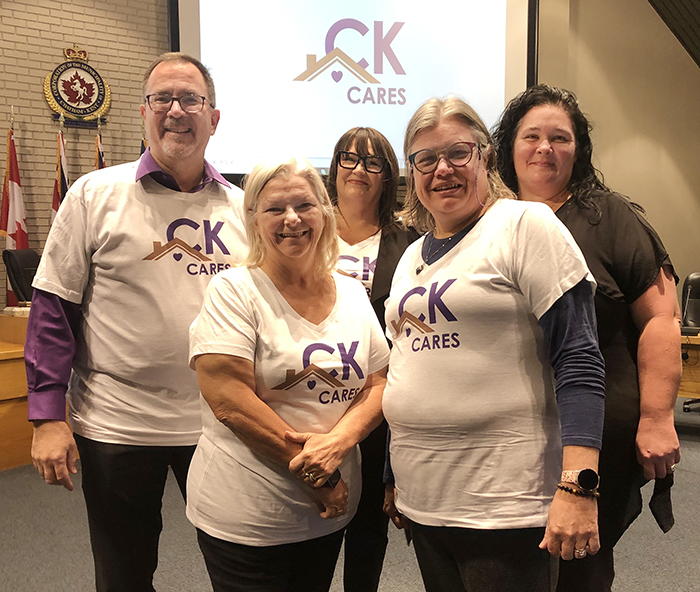
By Pam Wright
Local Journalism Initiative Reporter
The road to ending homelessness in Chatham-Kent begins with awareness.
That’s the goal behind a new multi-media campaign called CKCares. Its partners hope to build community support to end homelessness by debunking myths, sharing resources and challenging stereotypes with accurate information.
“Our shared goal is to end homelessness in Chatham-Kent,” said Polly Smith, director of employment and social services for the municipality. “We don’t want to have a need for emergency shelters…we want Chatham-Kent to get to a place where everyone who wants housing will get housing. We have a lot of work to get there and part of that work is building on the support in the community.”
The municipality provides emergency services and housing supports locally, including the operation of the Victoria Park Place shelter founded on Chatham’s east side earlier this year.
CKCares is part of the municipality’s strategy towards solving the problem.
“We want people to understand homelessness so they are more open to understand the work we are doing to end it,” Smith said.
Homelessness isn’t going away and isn’t unique to Chatham-Kent. The housing crisis is Ontario wide as rents in the province have doubled in the last four years. The cost of everyday essentials such as gas and groceries have also risen dramatically, putting low-income people in peril of losing their home.
According to Smith, in 2021 some 500 residents in Chatham-Kent experienced homelessness. The rental vacancy rate sits at around one per cent locally, whereas four per cent is considered healthy for a community.
But the municipality’s efforts to support the homeless are producing results.
Last month, Smith said 21 people were housed with the municipality’s help, however, another 17 people fell into homelessness for the first time.
Officials say three new people in Chatham-Kent, or families, find themselves homeless for the first time every week.
The “common denominator” with residents becoming homeless, said Smith, is poverty and the lack of affordable housing
The stereotype of the homeless is changing as well, she added, as more seniors and working people find themselves without shelter.
One story illustrating the importance of providing housing supports was discussed at the meeting. It involved a man in his 60s who was employed as a machinist for most of his life. However, when his relationship broke down, he found himself on the streets and unemployed because he couldn’t maintain his job while homeless.
He found a job and an apartment, but substance abuse reared its head and he found himself homeless again after being evicted. He then accessed services at the Victoria Park Place shelter. The man was connected to a housing specialist and after several unsuccessful housing attempts due to substance use, he was connected to a substance abuse specialist and subsequently stopped using and was successfully housed in September 2022 after months of uncertainty.
“He’s told us he’s very grateful for the services,” Smith noted, “but the real hero of the story is Jimmy (a pseudonym.) He did the hard work and heavy lifting,” staying the course.
Renee Geniole, operations co-ordinator of R.O.C.K. Missions, said changing misconceptions around the homeless is key.
“We are the boots on the ground going out and looking for people that for some reason are disconnected from social services, ” said Geniole. “The overarching idea of what we do is build relationships.”
Many who find themselves homeless have trauma, substance use and mental health issues, said Geniole, as well as “abject poverty.
“So, we want to find them and build relationships. We help them survive another day until they are ready to get back on that road to connecting again.
“What we do is hard, but we can’t do it without community,” Geniole acknowledged. “We can’t do it without our supporters. The people we serve are just people.”
In her comments, Hope Haven general manager Loree Bailey strongly urged people to put aside their stereotypical beliefs regarding the homeless.
“As long as we’re filled with and projecting stigma, and really hate, towards our neighbours, we aren’t helping anything,” Bailey said. “And you know what they say, ‘If you aren’t part of the solution, you really are part of the problem.’”
Since 2019, Hope Haven has been providing a day program for the homeless in Chatham-Kent and for four years prior it was the only overnight emergency shelter in the municipality. The organization also offers overnight shelter during extreme cold weather
Bailey stressed that everyone needs community, whether or not they have a home.
“The folks that you see in Chatham-Kent are your neighbours and they’re my neighbours,” she added.
Mayor Darrin Canniff, a strong supporter of CKCares, said new affordable housing is key to the solution, adding Chatham-Kent will continue to lobby upper tier governments for funding for new builds.
“I know Chatham-Kent is a welcoming place, I know people care about one another,” said Canniff. “We’re all neighbours here.”
On a good note, the municipality’s housing department has been working hard on the bricks and mortar side of the issue. There are currently five affordable housing builds in various stages across Chatham-Kent. This includes the modular construction of 27 seniors’ units on McNaughton Avenue, aimed at providing housing for seniors fleeing elder abuse or domestic violence and was developed under the Rapid Housing Initiative. The municipality received $5 million for the project.
Local residents who want to help are asked to consult the CKCares online to find out how they can donate or help in other ways and to share the #CKCares hashtag.
Residents are encouraged to visit http://letstalkchatham-kent.ca/ and learn more about what homelessness looks like in Chatham-Kent.






